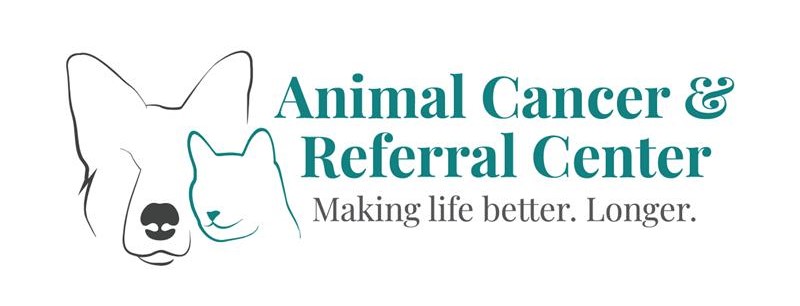Approximately 40% of pets over 9 years old will be diagnosed with cancer. Gone are the days where our family pets die of “old age”. More commonly today pet parents are noticing illness earlier in their pets and are pursuing referral to specialists in the area of need. As in human medicine, there are Oncologists to help treat cancer in our pets. More specifically, there are medical oncologists, surgical oncologists and radiation oncologists that all work together for the optimal care of dogs and cats with cancer.
Similarities between cancer diagnosis and treatment in humans and our veterinary patients, however, are varied. The tests available and the approach to obtaining a cancer diagnosis are very similar. Treatments may include some of the same drugs, but the goals for treatment and the doses used to accomplish these goals are very different. Staging tests are common in people and patients when cancer is suspected. These tests often include bloodwork, urinalysis, chest x rays, ultrasound, CT scan, MRI, and biopsy. The information provided using these tests help Oncologists determine the most appropriate treatment options for each individual patient and their disease. Often recommendations are made regarding a list of tests that would ideally be performed. Then based on the information each test provides and its cost, the owners and veterinarian can choose which tests to include in the plan. More information is always best, but this may not be possible based on cost of the test, or risk to the patient.
Treatment for cancer in dogs and cats often can be divided into three types: medical (includes chemotherapy or palliative care), surgery for mass removal, and radiation therapy. Unlike human cancer treatment, where an aggressive approach with all three modalities is often pursued at any cost, in hope of a cure or complete remission, in veterinary oncology our goal is to provide the best quality of life for as long as possible. Cure is rarely obtained and often would not be possible without significant side effects to the patient. Chemotherapy is often administered at lower doses and often one at a time. In this way, side effects are often self-limiting. Less than 5% of veterinary patients are hospitalized for chemotherapy related illness and more than 80% have a good quality of life for most of the time. Chemotherapy comes in many forms as well. Oral medication administered at home or in hospital, a quick intravenous bolus versus a long infusion, or subcutaneous treatment.
Surgery ideally is planned first. This involves performing a biopsy and often a CT scan. These tests provide information about the location of the mass as well as a diagnosis. Since not cancers require the same surgical approach. Depending on the CT and biopsy results, a small surgery or a larger, more extensive surgery, may be recommended depending on the goals – palliation versus cure. We have many advancements in pain control in veterinary patients and so post-operative pain management is very successful in maintaining the comfort of the patient.
In some cases where complete removal of the cancer is not possible with surgery, then removal of the mass may be followed by radiation therapy. Radiation can be viewed as a high dose x ray beam that is aimed at a target, the tumor, and administers a dose of radiation to a local area. The is performed under general anesthesia so the patient does not move. In cases where surgery is not possible, then radiation can help to stabilize the size of the mass or shrink it to improve the comfort of the patient. Side effects for radiation therapy in dogs and cats are less severe with fewer doses. They can occur as the number of treatments increases and typically heal a few weeks after the treatment is completed.
When faced with the possibility of cancer in our family pets, it is important to seek information so that the overall health of the pet can be assessed and treatment options can be provided. The earlier a problem or disease process is detected, then generally the better the outcome. Contact your veterinarian or local oncologist for any questions or concerns your may have.


